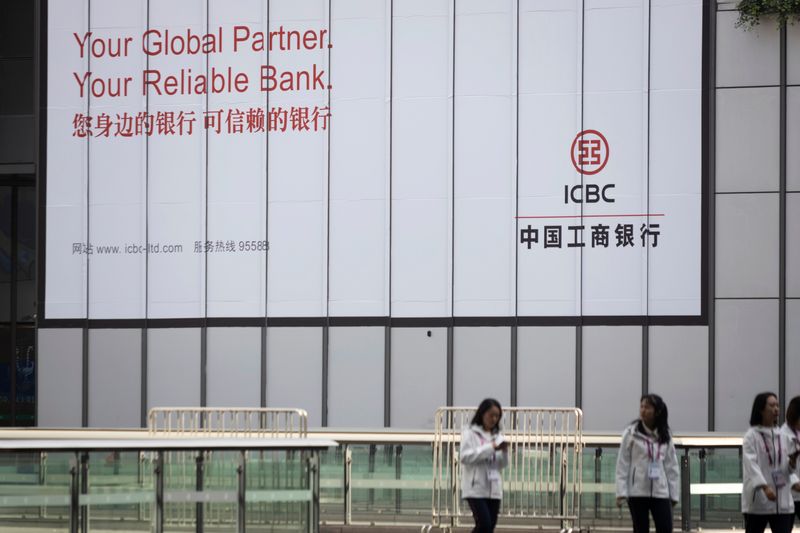SHANGHAI/SINGAPORE (Reuters) - Chinese banks are facing increasing risks from rising non-performing loans (NPLs) and diminishing returns, making them a lightning rod for investors' worries about the world's second-largest economy.
Concerns about their exposure to local government financing vehicles (LGFVs), the investment firms that fund mainly infrastructure projects for local governments, and the crisis-hit property sector have pummelled their shares this week, dragging them to their steepest drops in about eight years.
Authorities appeared anxious to nip the selloff after Goldman Sachs (NYSE:GS)' downgrade of some major lenders to "Sell" ratings caused the Hong Kong-listed banking sector index to tumble more than 10% in three sessions.
Goldman's three-part series refers to banks' writing down loans to the property sector as well as the pressure on bank profits as they expand or roll over loans and other lending to LGFVs.
Goldman's report is based on "pessimistic assumptions", the state-backed Securities Times said in an editorial on Friday, and that there was "a misinterpretation".
That temporarily put a floor under shares of banks such as Industrial and Commercial Bank of China (ICBC), which is down 13% in two months, but failed to boost sentiment in markets hobbled by China's stop-go stimulus announcements, sagging demand and worries that banks will be pressed into helping.
"LGFVs' debt risk may ultimately need to be borne by the state sector, including China's state commercial banks," said Raymond Yeung, chief Greater China economist at ANZ.
"The central government knows what's happening regarding the size of the debts and where the weak links are, so the probability of systemic risks will be greatly reduced. The possibility of defaults by a large number of LGFVs is low."
Sell-side analysts seemed to concur that the risk of a crisis emanating from the gargantuan $13 trillion LGFV debt pile is low, but banks will still take a hit from rising non-performing loans and falling returns.
"If local governments’ revenues continue to worsen, then NPLs among some Chinese banks may go up. Chinese banks would have to shoulder up this cost," said Gary Ng, senior economist at Natixis Corporate & Investment Banking in Hong Kong.
CHEAP LOANS
The Chinese economy grew at a faster-than-expected clip in the first quarter, rebounding from three years of pandemic restrictions, but the recovery has been patchy with exports disappointing and households reluctant to spend.
China reported strong new bank lending in the first two months of this year, but that lending has since slowed, spurring the first rate cuts for this year in June that pushed down the benchmark one-year loan prime rate (LPR) to 3.55%.
Analysts have, however, been warning about banks for months.
Bankers told Reuters earlier this year that growth in credit was mainly owing to loans to the policy-driven infrastructure sector, with some big banks offering rates as low as below 2% to state-owned companies, levels lower than deposit rates and pressuring margins, they said.
China's banks have seen their net interest margins, a key profitability gauge, shrink by a percentage point over the past decade to around 1.7% in the first quarter of 2023, Refinitiv data shows. The ratio of stock prices to earnings (PE) is close to 4, half the levels in 2018.
Goldman said it had downgraded Agricultural Bank of China (AgBank) to "Sell" from "Neutral", while cutting Industrial and Commercial Bank of China (ICBC) and Industrial Bank to "Sell" from "Buy".
While the low valuations suggested share prices could rise, Goldman said a further correction was likely due to local government debt eating into margins and more losses elsewhere. "This could weaken earnings growth, pressure capital accumulation and thus pressure dividend payout levels," Goldman wrote.
LGFV DEBT PAYS
Analysts at Morgan Stanley (NYSE:MS) also had a note on banks this week that said China's banks have been "in a constant process of risk digestion", with 25% of industrial and trade finance digested as NPLs between 2016 and 2020, and 7-8% of property loans NPLs digested in the past two years, including bankruptcies of many corporates.
The quasi-government nature of LGFVs and hence a need to avoid systemic risks meant the model of bankruptcy and write-offs wouldn't be followed, Morgan Stanley said.
As per Goldman estimates, the six largest banks account for $4.2 trillion of local government debt, with capacity to take on more.

Even if yields on such debt fall, Goldman reckons banks are happy to take on more, because of the superior tax treatment, lower risk weighting for capital provisioning and the potential for these being allowed as collateral for central bank funding.
Goldman estimates that the cushion of tax and capital savings will limit the decline in return on equity for banks it covers, forecasting a 12.5% ROE in 2023 and 11.9% by 2025. That's far healthier than ratios for most banks in the United States and Europe.